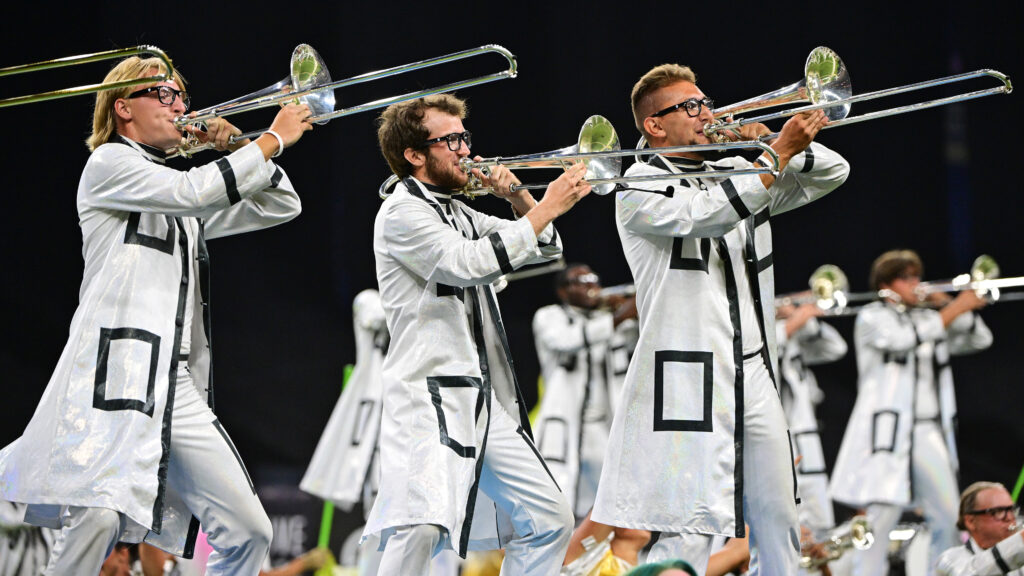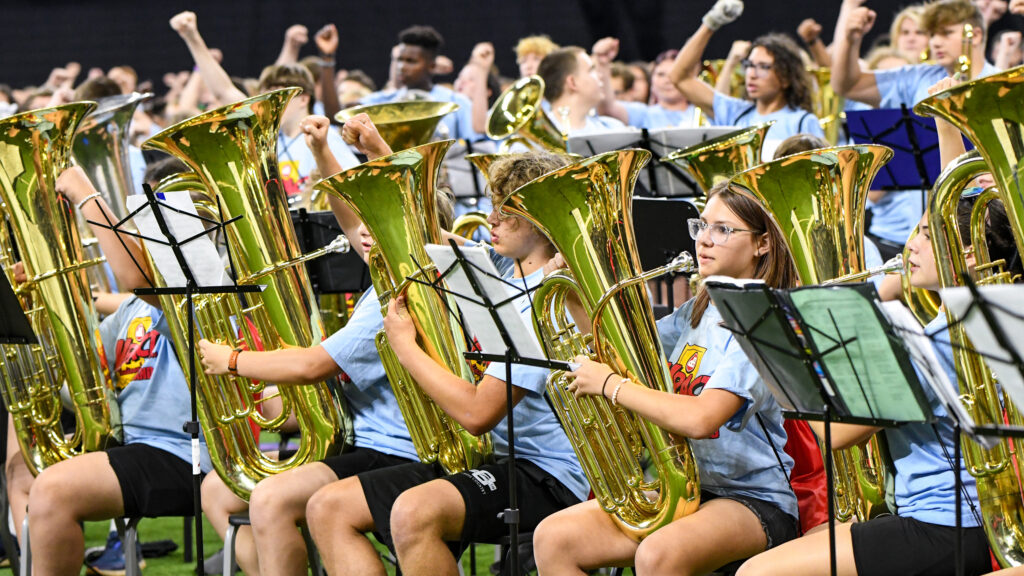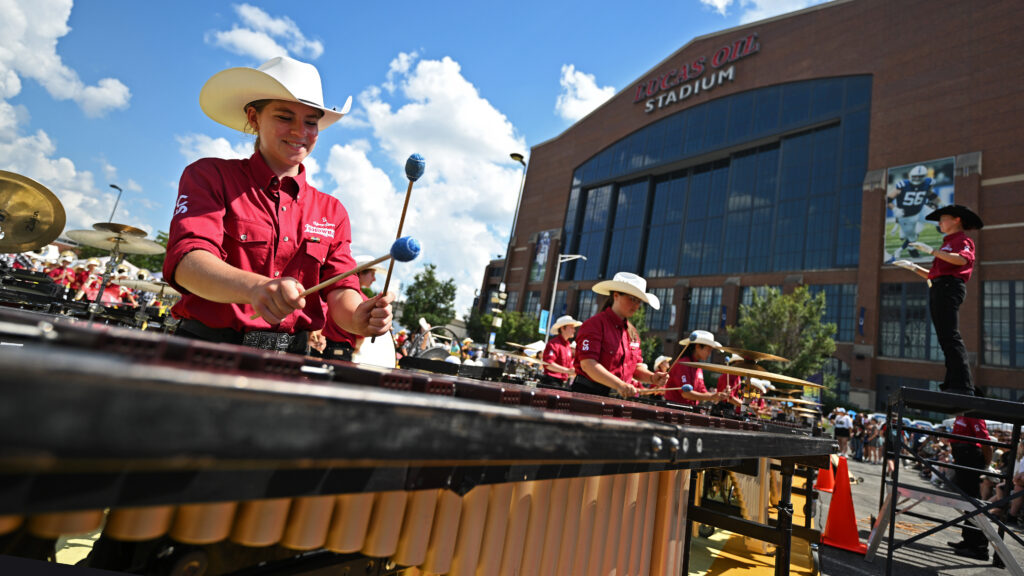Matthew J. Smith, a baritone player from the Seattle Cascades, will be filing periodic reports from the road this season. Smith is a 20-year-old student at California State University, Fresno currently studying music (clarinet emphasis). He wants to become a music educator. This is the story of how he became a member of the Cascades.

Since the age of 4 I always knew I wanted to teach. It wasn’t until my sophomore year of high school when I decided I wanted to become a “band director” (music educator). The summer of 1996 was my freshman year band camp; when I got my first real experience with musicians on a high caliber. I had not touched a musical instrument since 5th grade, and here I was trying out for the marching band at Hoover High School in Fresno, Calif.
When I first started music in the 4th grade, I started off as a string player; I broke the bridge on the viola, and was told to try something less complex. I then tried to take up the trombone, but my arms were to short, and I could barely figure out how to reassemble the slide after it had fallen out of place.
My elementary school music educator must have thought I was a lost cause — he had tried to give me everything possible to play, but I kept having a negative reaction to each scenario. So I dropped music for the remainder of that year thinking I couldn’t hang.
The next year, I signed up for music again thinking I could give it another try but on something that I wouldn’t be able to destroy and could play. Flute was the instrument that I decided to study that year, and needless to say, my music educator was able to make a musician out of me once and for all. After all of the hard work and maturing I did on the flute, the district where I was at the time, in Redwood City, Calif., decided to cut music from the public schools. That is what contributed to the gap in musical career from that point until my freshman year of high school.
Aug. 12, 1996, was a day I will never forget. There was a variety of talent in the high school band, and I had no idea of what was going on. All I knew was that I was going to be in marching band, somehow, some way. I did not own my own flute at the time, and all of the school flutes were being used by vets.
What was I to do? I had no plan B, and didn’t know how to play anything else. So I took a look around the band room as everyone was socializing and practicing, and immediately started to shed a tear. A vet from the clarinet section asked me “What is wrong?” and “What can I do to help you?” I replied with “Can you find me a flute?” She tried herself to scalp out a flute for me, but no luck.
We both at that time went to the director, and he gave me my options as to what I could within the band. My choices were very limited, and they were to choose pit percussion or clarinet. I chose the clarinet, because it looked like it had the same fingerings as the flute; and it only took me three days to learn the fingerings and how to get it to speak. So last chair I sat for my freshman year, learning how to play a new instrument.
The summer proceeding my sophomore year of high school, I was able to take a clarinet home to practice and become more proficient. I did just that, and then some; and it reflected in my audition results when I earned first chair out of 12 clarinetists in the band. To be honest, I didn’t have any goals at that time for the clarinet. My goal was just to be in the band and have fun.
Along with the summer practicing I did that year, I found out we would have a new band director for the 1997 school year — an energetic director who would open the doors to other venues in music. That first week with our new director, he kept mentioning this ‘thing’ called drum corps. He would say things like “When I was in the Blue Devils in 1986 …” and “I played a bugle …”
I had no idea as to what he was talking about, nor did many of my peers. So after many questions about what drum corps was, he followed up his stories with a VHS tape of DCI finals (I can’t remember which year), and we (the band) were blown away by the musicality and technique used by these professional “marching bands” (as we thought of them then).
“Where are the woodwinds?” we asked. He pointed out to us that there were no flutes, clarinets or saxophones in this type of group. The next question was, “There are that many talented brass musicians in the corps?”
I don’t believe we got a solid answer on that one. Afterward he talked to us about what type of work went into what we had just watched, and from that moment on I knew we were blessed to have this man as our director.
He brought with him knowledge and motivation that would inspire us students to set new standards for our program, as well as individuals. He is the man who inspired me to continue music beyond high school. I honestly can say, if it weren’t for him, I wouldn’t have become a music major, nor would I be as aspiring as I am today to become a music educator.
Throughout those high school years I had dreamed of being in a drum and bugle corps, working hard, performing under giant stadium lights for large crowds, and meeting others who were as dedicated to make music as I was. I couldn’t seem to think that I could learn a brass instrument, so I put that dream off and continued to focus on clarinet, not counting the years as they went by.
I graduated high school in 2000, with high honors in academics and music. I went on to college that next fall. My goal was to learn how to play a brass instrument in the college marching band to prepare myself for a potential corps audition, because they didn’t care what you played as long as you were in the band.
I had talked with some corps vets from Santa Clara Vanguard the Blue Devils, and they said it would be best if I tried to learn baritone if I were going to march in a corps. So I immediately took up the baritone. I learned the fingerings, and some of the low range, but I had to quit marching band for some health issues in the middle of the season. It just seemed as if everything that could happen happened! Yet again, I put off this dream of being in a drum and bugle corps. I had to wait another year two years to attack this goal at full force.
In December of 2002, I finally made it to my first drum corps camp with the Seattle Cascades. All I knew was the basic information that vets from other corps told me, as well as what the random Cascades members told me online about drum corps.
So I arrived at the camp (it was similar to my first year of high school band camp) and met some vet members of the corps, which broke the ice. My first camp was difficult for me (I didn’t let many know) — I hadn’t played baritone at full force (not even in marching band), and I had never played a ‘G’ bugle. I felt very unsure of myself prior to the audition camp and during it, I almost pulled out numerous times before booking my flight to Seattle. Something inside me kept telling me, your time is running out, you can’t do drum corps forever.
All of the Seattle Cascades staff were very supportive, and offered a lot of constructive criticism to me throughout the camp. I almost thought they would tell me, “Try again next year,” but everyone who attended the first camp was asked back to the second camp, which was when cuts would be made.
The staff gave us exercises and music to prepare for the next camp, which would be in January. I took it home and did my personal best to improve on the prior audition I had in December.
Sure enough, when I came back in January, I had improved, and was approached by a staff member after that camp with some very encouraging words about my audition. Being the perfectionist that I am, I still wasn’t satisfied with my audition – but I was flabbergasted that I had made the horn line for this upcoming season of summer 2003.
Each camp has been a learning experience for me, just as my high school band camp was when I had to learn a new instrument. With each camp, I set goals, and I work hard each time to achieve them. Each flight I take back home to California from camp, I evaluate what I could have done better at each camp, what I improved on from prior camps, and what I will need to do to prepare myself for the following camps. This is what’s going to help me reach above my standards for the summer.
Now I have told my story — from becoming a musician by playing musical chairs (the changing of instruments), losing out when music was cut from my education at an early age, being inspired by a director, setting the paradigm of my clarinet section in both high school and college, and earning a spot in Seattle Cascades. I’d like you to reflect back on your past experiences as a musician, look deeper into what music really means to you, think of that person who inspired you the most, and think of the achievements you have made as individual. Every detail that happens in our life happens for a reason. Many of us will leave a lot at home when we go away this summer; but it’s important to never forget where you came from.





